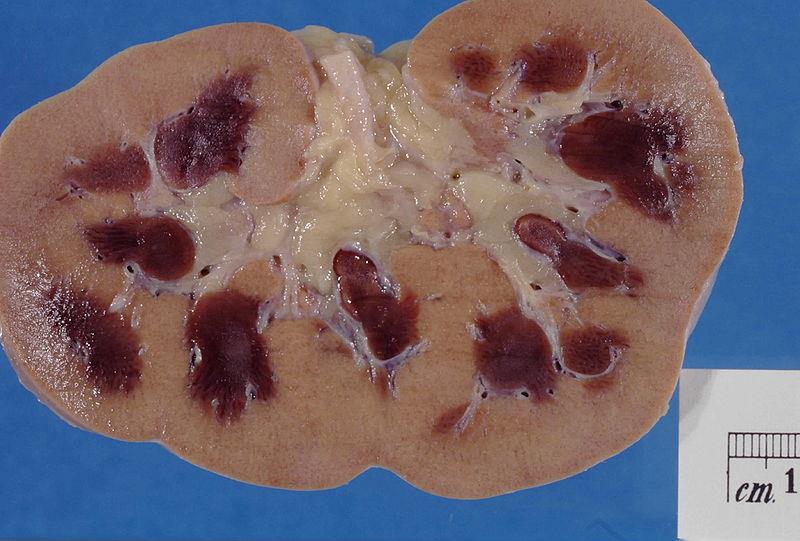Joseph R. Anticaglia, MD
Medical Advisory Board
Chronic kidney disease (CKD causes a gradual loss of kidney function over time. CKD happens when the kidneys are unable to remove waste products and excess fluid from the blood causing a buildup of toxic material in the bloodstream. You may have ongoing kidney damage for many months to years without symptoms until the kidneys are almost ninety percent non-functional. Besides kidney disease, this condition can lead to hypertension, coronary artery disease. stroke and other problems.
According to the National Kidney Foundation, “37 million adults in the United States are living with CKD and approximately 90% do not even know they have it.” It affects approximately one out of ten Americans.

Symptoms
Usually, there are no symptoms in the early stages of CKF.. The most common physical sign in the early stages of the disease is hypertension. Symptoms and signs develop slowly as metabolic waste products accumulate, and the glomerular filtration rate progressively worsens. The symptoms include being tired, feeling weak, difficulty breathing, sleeping, or thinking, nausea, vomiting, loss of appetite, swollen ankles, feet or hands, metallic taste in the mouth and halitosis.
Causes
At least 70% of late stage chronic kidney disease cases are caused by hypertension or diabetes. There are reversible causes of kidney disease which can be managed with timely treatment of infections, urinary blockage, side effects of drugs, heart failure as well as adequate control of high blood pressure, and diabetes. You are at an increased risk of developing kidney disease if you smoke, are overweight-obese. A person may have a family history of this disease.
Diagnosis
To diagnose chronic kidney disease and the stage of the disease, your doctor will obtain a medical history, perform a physical examination, check your blood pressure, order blood and urine tests, and imaging studies. Ultrasouond is used to evaluate the size and appearance of the kidneys.
- Blood pressure — check for hypertension
- eGFR (estimated glomerular filtration rate) — blood test
- ACR (albumin/creatinine ratio) — urine test
eGRF measures how well your kidneys are functioning. It’s a quick way to understand how well the kidneys are removing waste material and toxins from the blood. Healthy people have an eGFR of 90 or above.
ACR helps doctors evaluate kidney function and disease. Albumin is a protein that is found in the blood but with damage kidneys, it can leak into the urine. Creatinine is a waste product that comes from the breakdown of muscle tissue..
Snapshot of Kidney Functions
To help understand kidney disease, it is useful to get a picture of what they do, and the devastation caused by non-functioning kidneys. The remarkable kidneys are crucial to our overall health. They perform several survival functions:
- The kidneys clean the blood of waste products, extra fluid, toxins, and harmful chemicals.
- They help regulate blood pressure, and red blood cell production.
- They work to maintain acid-base balance by excreting excess acids and bases in the urine.
- The kidneys preserve the right balance of electrolytes, such as sodium, potassium, calcium and bicarbonate in the blood.
- They convert inactive vitamin D into its active form that helps the body absorb calcium and phosphorus which the body needs for bone health. It also has multiple beneficial effects on the nervous system.
Five Stages of Kidney Disease
When kidney disease progresses to kidney failure, there is a 100% shutdown in kidney function. The stages include:
Stages 1-2
In the early stages of CKD, your kidneys are working well. You may not know you have kidney disease since there are usually no obvious symptoms or signs. Incidental findings on a routine blood test (elevated BUN), or a urine test (protein or blood in the urine), or a person with an elevated blood pressure may suggest a potential kidney problem.
Stage 1 — your eGFR result will be more than 90
Stage 2 — your eGFR result will be 60 to 89
Stages 3-4
In the middle stages, most people are diagnosed with CKD. You may start to feel sick, symptoms become more obvious as the waste materials build up in your body.
Stage 3 — your eGFR result will be 30 to 59
Stage 4 — your eGFR result will be 15 to 29
Stage 5
This is the late, kidney failure stage of the disease. The eGFR is below 15, and the patient needs dialysis or a kidney transplant to survive.
Complications
Some of the complication of CKF include hypertension, anemia, heart failure, brittle bones, fluid buildup, nerve damage and weakened immune system.
Treatment focuses on managing the underlying conditions, controlling symptoms, and slowing disease progression through lifestyle modifications, and medications. In advanced stages of kidney failure, dialysis or kidney transplant is necessary for survival.
Chronic Kidney Disease is a slowly progressive loss of kidney function. CKD is classified into five stages based on the severity of kidney damage and reduction in glomerular filtration rate. As the disease advances, patients are at increased risk of complications and kidney failure. Early detection and intervention are crucial in improving outcomes and delaying the progression of CkD
Glossary
ACR (albumin/creatinine ratio) — urine test An uACR level of 30 mg/g or higher suggests an increased risk for kidney disease.
References
- Tonja C. Dirkx et al; Kidney Disease; Current Medical Diagnosis and Treatment, 2018
- CDC; Chronic Kidney Disease Basics; Centers for Disease Control and Prevention (U. S.);. February 28, 2022
- American Diabetes Association; Chronic Kidney Disease (Nephropathy)
- NIH, NIDDK What Is Chronic Kidney Disease? June 2017
- Chronic Kidney Disease; S. R. Vaidya; N. R. Aeddula; Chronic Kidney Disease; StatPearls, October 24, 2022
This article is intended solely as a learning experience. Please consult your physician for diagnostic and treatment options.

